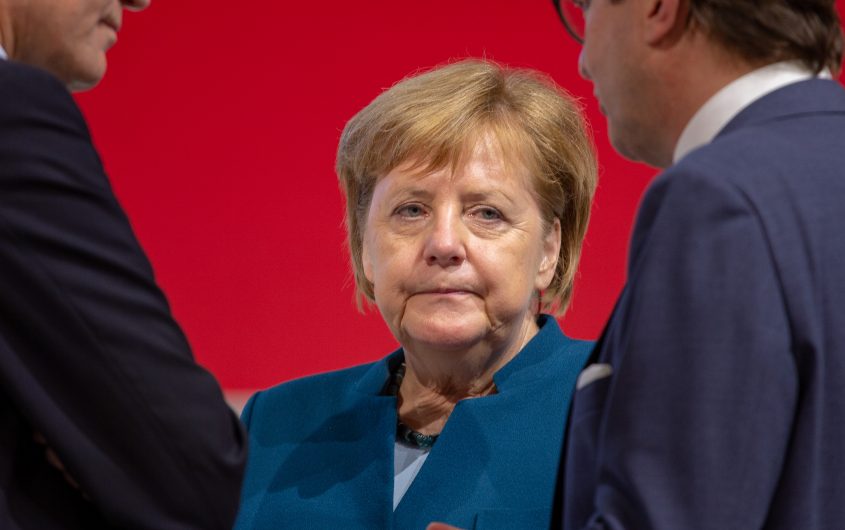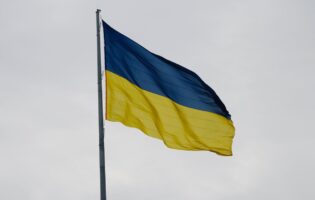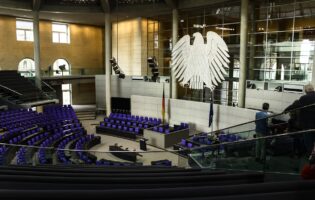
Olaf Kosinsky, License: CC BY-SA 3.0-de via Wikimedia Commons
Anticipating Uncertainty: Lessons from 1989 for 2020

Jackson Janes
President Emeritus of AGI
Jackson Janes is the President Emeritus of the American-German Institute at the Johns Hopkins University in Washington, DC, where he has been affiliated since 1989.
Dr. Janes has been engaged in German-American affairs in numerous capacities over many years. He has studied and taught in German universities in Freiburg, Giessen and Tübingen. He was the Director of the German-American Institute in Tübingen (1977-1980) and then directed the European office of The German Marshall Fund of the United States in Bonn (1980-1985). Before joining AICGS, he served as Director of Program Development at the University Center for International Studies at the University of Pittsburgh (1986-1988). He was also Chair of the German Speaking Areas in Europe Program at the Foreign Service Institute in Washington, DC, from 1999-2000 and is Honorary President of the International Association for the Study of German Politics .
Dr. Janes is a member of the Council on Foreign Relations, the International Institute for Strategic Studies, the Atlantic Council of the United States, and American Purpose. He serves on the advisory boards of the Berlin office of the American Jewish Committee, and the Beirat der Zeitschrift für Außen- und Sicherheitspolitik (ZfAS). He serves on the Selection Committee for the Bundeskanzler Fellowships for the Alexander von Humboldt Foundation.
Dr. Janes has lectured throughout Europe and the United States and has published extensively on issues dealing with Germany, German-American relations, and transatlantic affairs. In addition to regular commentary given to European and American news radio, he has appeared on CBS, CNN, C-SPAN, PBS, CBC, and is a frequent commentator on German television. Dr. Janes is listed in Who’s Who in America and Who’s Who in Education.
In 2005, Dr. Janes was awarded the Officer’s Cross of the Order of Merit of the Federal Republic of Germany, Germany’s highest civilian award.
Education:
Ph.D., International Relations, Claremont Graduate School, Claremont, California
M.A., Divinity School, University of Chicago
B.A., Sociology, Colgate University
Expertise:
Transatlantic relations, German-American relations, domestic German politics, German-EU relations, transatlantic affairs.
__
As we approach the 30th anniversary of the fall of the Berlin Wall on November 9, some of us might recall where we were when we heard the news of that historic event. That might include Angela Merkel who was in a sauna that evening somewhere in East Berlin, in no hurry to join the rush to hop over the Wall like thousands of others. That rather stoic characteristic of Merkel was also evident sixteen years later when the practical physicist was sworn in as chancellor in Berlin. It was also to be one of her hallmarks over the next fourteen years in that office, elected four consecutive times. If she serves out her fourth term, she will have equaled the sixteen-year record of Helmut Kohl, the longest serving chancellor in the history of the Federal Republic.
Read more on the Fall of the Berlin Wall from AGI
The political landscape was undoubtedly difficult thirty years ago, when few were prepared and fewer yet expected that the Wall would suddenly fall. Today, the political landscape is also difficult to anticipate, albeit in different ways, and it will be even more difficult a year or two from now.
Today, the political landscape is also difficult to anticipate, albeit in different ways, and it will be even more difficult a year or two from now.
Speculation about the post-Merkel era after she steps down in 2021 has been escalating over the past year. As soon as Chancellor Merkel made the announcement that she was ready to retire, the machinery of politics kicked in. Merkel gave up her position as Chair of her party and was succeeded by Annegret Kramp-Karrenbauer (known as AKK) after a short leadership contest.
 Merkel has advocated for AKK to be her successor but ultimately it is the party that decides, and how that process will unfold is not clear. The next CDU party convention is to be held on the weekend of November 22 and it promises to be a decisive moment for Merkel, AKK, and indeed for a party that is facing one of its most difficult challenges since it was founded over seven decades ago. For the chancellor, the party convention will likely be a platform for a good deal of criticism at what is perceived as her lack of leadership at a critical moment. While Merkel remains personally popular, the CDU has taken heavy losses in the last three regional elections in eastern Germany and it has been steadily losing traction nationally. Those complaining about Merkel tend to criticize her for having moved the party too far to the left while now in her third coalition with the Social Democrats. Bickering about domestic policies, particularly on the volatile immigration issues, has focused on blaming Merkel for seeding the ground for the far-right Alternative for Germany (AfD) and losing CDU voters. Yet beyond specific debates over policy, the larger criticism is that Merkel’s wait-and-see approach to pressing issues has exhausted the party’s ability to recapture lost support. The pragmatic, less dramatic, “no drama Angela” leaves many in the party wondering what she thinks about the crisis in Syria, the decisions taken in Brussels, or where Germany is headed with regard to its economic challenges ahead.
Merkel has advocated for AKK to be her successor but ultimately it is the party that decides, and how that process will unfold is not clear. The next CDU party convention is to be held on the weekend of November 22 and it promises to be a decisive moment for Merkel, AKK, and indeed for a party that is facing one of its most difficult challenges since it was founded over seven decades ago. For the chancellor, the party convention will likely be a platform for a good deal of criticism at what is perceived as her lack of leadership at a critical moment. While Merkel remains personally popular, the CDU has taken heavy losses in the last three regional elections in eastern Germany and it has been steadily losing traction nationally. Those complaining about Merkel tend to criticize her for having moved the party too far to the left while now in her third coalition with the Social Democrats. Bickering about domestic policies, particularly on the volatile immigration issues, has focused on blaming Merkel for seeding the ground for the far-right Alternative for Germany (AfD) and losing CDU voters. Yet beyond specific debates over policy, the larger criticism is that Merkel’s wait-and-see approach to pressing issues has exhausted the party’s ability to recapture lost support. The pragmatic, less dramatic, “no drama Angela” leaves many in the party wondering what she thinks about the crisis in Syria, the decisions taken in Brussels, or where Germany is headed with regard to its economic challenges ahead.
All this is in contrast to the early phase in Merkel’s long tenure when she was seen as the central anchor in the EU; in the transatlantic storms following Trump’s election; and in dealing with Russia, China, or elsewhere around the globe. Many saw her as having inherited the job as leader of the Western world since the eruption of these many volcanoes. One particular occasion where that seemed to be illustrated was when her warmly-received speech at the Munich Security Conference in February 2019 stood in stark contrast to that of U.S. vice president Mike Pence. Yet domestic politics are now crowding out these images and the concern about who will follow Merkel has taken center stage in Germany.
Annegret Kramp-Karrenbauer is also facing headwinds as she prepares for her appearance at the CDU party convention in Leipzig. After having won a tight race to become the Chair of the party almost a year ago, AKK believed she would use that platform to prepare for presenting herself as Merkel’s successor. But events in Brussels changed her mind. Following the selection of Ursula von der Leyen to be the EU Commission president last summer, AKK decided to join Merkel’s cabinet as defense minister following von der Leyen’s exit from that post. In doing so, she was waging a bet that being saddled with one of the hardest jobs in the government would strengthen her quest to be elected chancellor at the next election. It is a risky decision as the job has been an unforgiving one for her predecessors. But she made that decision with Merkel’s blessing. It remains to be seen whether it will pay off.
Meanwhile, AKK has taken some hits in her efforts to gain profile in the past year and her popularity has been sinking. In her efforts to differentiate herself from Merkel, AKK tried to present herself with a more conservative style on domestic issues, including a tough stance on asylum and immigration enforcement. As a conservative Catholic, she rejects same-sex marriage and opposes liberalizing Germany’s abortion laws. Nevertheless, she has not managed to gain traction in the polls in the wake of losses for the party in both regional elections as well as in the European parliamentary elections over the past year.
While that is happening, others in the CDU are positioning themselves to be seen as an alternate candidate for the chairmanship. One of them is Friedrich Merz who campaigned for the job last fall and narrowly lost at a party convention in Hamburg. He remains a favorite of those who feel attracted to his robust presentations. He will be making one of those speeches at the party convention in Leipzig. No doubt it will have an impact on those attending. Another aspirant might be the minister-president of North Rhine-Westphalia, Armin Laschet. Germany’s largest state carries a lot of weight in the CDU. Yet speeches given in November will likely not result in dramatic changes in the CDU—at least not yet.
It is still a year until the party decides on its chancellor-candidate for the 2021 election—at least, that’s the plan. That plan can be upended by a force beyond the CDU’s control. Two weeks after the CDU meets in Leipzig, the SPD will meet to confirm its new party leadership. If that leadership were to decide that the current coalition with the CDU was no longer in the interest of the party, they could propose to withdraw from the government. That could result in early elections in 2020. Whether AKK would be the CDU’s candidate would then need to be decided quickly. And her record at that point as defense minister would be a major metric for that decision, along with any number of other unpredictable factors—such as a recession, another foreign or domestic policy crisis, or a push among the party membership to find what they think might be a stronger candidate. If the assumption would be that another coalition will not be with the SPD (maybe the Greens will loom larger), the real question will be: who is the best CDU messenger to send into the election campaign, with what message, at a time when coalition building is increasingly challenging. Right now, there is not a clear answer.
Just as not many were prepared and fewer yet expected that the Wall would suddenly fall on November 9, 1989, many are uncertain of what the future holds today. If a lesson can be learned from the past, it is to not underestimate either the pace or the impact of change. The night the Berlin Wall came down, a mix of confusing signals and the need to respond to the unpredictable led to history being made without expecting it.
As the saying goes, life is what happens when you are making other plans.









